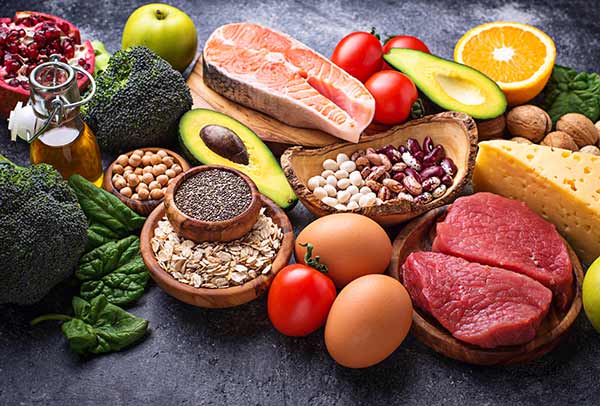In this topic, we will discuss nutrition and supplements. There are no real foods or supplements for people over 40. We will assume that we are more prone to inflammation and certain deficiencies.
First of all, the basis of nutrition is still food, solid food!!!
In order to properly metabolize food, we need to digest it properly.
The intestinal flora, also called microbiota, is the object of all the attention of scientists. Although the many bacteria we carry in our bellies are far from having revealed all their secrets, there is no longer any doubt that they play a crucial role in our health. That’s why it’s important to take good care of it.
The human gut contains an average of 100,000 billion bacteria from 400 different species. This microbial flora is very important because it contributes to the proper functioning of the digestive system and the immune system (natural defenses, white blood cells, antibodies, etc.). An infection, prolonged stress, illness or taking antibiotics are factors that can disturb and unbalance the composition of this flora. Antibiotic use is the most important factor of aggression. These imbalances in the microbial flora have harmful effects that can affect our ability to defend ourselves against bad bacteria. You will therefore understand that it is important to maintain the microbial flora of our intestine and at best to strengthen it. This is where probiotics come in!
PROBIOTICS
According to the World Health Organization, probiotics are living bacteria that, when consumed regularly and in sufficient quantity, have a potentially beneficial effect on health. In this sense, probiotics modify the flora of the intestine so as to favor the presence of good bacteria, to the detriment of bad ones. This improves the long-term balance of the flora and makes it more resistant to aggression. In addition, probiotics facilitate the recovery of the microbial flora of the intestine if there has been an imbalance and contribute to strengthening the immune system, while helping the digestive system.
The dosage: The best ones belong to the Lactobacillus and Bifidobacterium genera present in yoghurts, but before reaching the dose of 1 billion… that’s going to make a lot of dairy products which, in high doses, are inflammatory. Therefore, prefer food supplements.
PREBIOTICS
The prebiotic is a chemical compound related to dietary fiber. They can be oligosaccharides for example, small sweet molecules, which will serve during their intestinal transit as a source of energy for the bacteria and thus stimulate the activity and certain bacterial populations of our intestines. It has been shown that some prebiotics are able to diversify the activity of the intestinal microbiota and some provide interesting functions in terms of modulation of intestinal transit or modulation of functions, calcium absorption for example.”
Generally, these are foods that contain normally non-digestible carbohydrates such as
inulin, fructo-oligosaccharides (FOS) and galacto-oligosaccharides (GOS)
.
We cannot digest these carbohydrates, but lactobacilli and bifidobacilli (probiotics) feed on them.
Okay Thor49, we’ve gone over how the digestive system works, but what good does it do us?
Patience, I’m getting there. Probiotics and prebiotics are therefore inseparable.
Fructo-oligosaccharides (FOS) are part of the so-called prebiotic substances, i.e. substances that promote the proliferation of probiotic bacteria. Fructo-oligosaccharides, also called oligofructoses or FOS, are substances composed of two sugars, glucose and fructose. Fructo-oligosaccharides are not assimilated by the body but are digested by the intestinal flora.
Note from Thor49 : People who are lactose intolerant (milk sugar), those with gallstones, those whose intestines are easily irritated by fiber, and those who have undergone radiation therapy to the digestive system should be cautious with FOS.
Galacto-oligosaccharides (GOS) are also part of the so-called prebiotic substances. They might even be more potent of a prebiotic than FOS and inulin.
FOODS RICH IN PREBIOTICS
Vegetables: Garlic, Artichoke, Broccoli, Asparagus, Cabbage, Shallots, Green beans, Onion, Tomato…
Pulses: Lentils, chickpeas, red, white and black beans…
Fruits: Pineapples, Bananas, Pears, Red fruits, Citrus fruits…
Grains: Oats, Rye, Barley…
Oilseeds: Almonds, Walnuts, Pistachios…
Tell me Thor49, we are not going to eat only probiotics and prebiotics?
No, but you should focus on anti-inflammatory foods.
What are the principles of the anti-inflammatory diet?
* Protect the immune system.
* Help the body to resist and adapt to changes.
* Reduce the risk of diseases with an inflammatory component (cardiovascular diseases, asthma, Alzheimer’s disease, irritable bowel syndrome, cancer, autoimmune diseases, etc.)
* Increase healthy life expectancy.
What foods should I avoid?
Foods that cause inflammation include sugar, high-fat meats, food additives such as nitrates, and saturated fats. Hydrogenated vegetable oils, such as those found in margarines, are particularly harmful, as are all simple sugars, including corn-based sweeteners, cow’s milk and anything containing gluten.
It is best to avoid these foods as much as possible and replace them with healthy alternatives.
Lipids:
Inflammation is part of the body’s normal response to infection or injury. However, disproportionate or excessive inflammation contributes to many acute or chronic diseases. The inflammatory process is characterized by the production of inflammatory cytokines, eicosanoids derived from arachidonic acid and other inflammatory agents. Long-chain omega-3s, particularly EPA and DHA, decrease the production of inflammatory eicosanoids, cytokines, reactive oxygen species and the expression of adhesive molecules.
EPA and DHA act both directly and indirectly. The direct action of omega-3 intervenes by a competitive replacement of arachidonic acid as a substrate of eicosanoids and by the inhibition of its metabolism. The indirect action of omega-3 is exerted by an alteration of the expression of inflammatory genes through an action on the activator of the transcription factor. Finally, omega-3 acids give rise to anti-inflammatory mediators. Thanks to these multiple actions, omega-3 fatty acids appear to be powerful anti-inflammatory agents that may be useful in many chronic or acute inflammatory diseases.
It is beneficial for humans to have a diet with a ratio of 4 to 1, i.e. four times more omega-3 fatty acids (from fish, nuts and flaxseed) than omega-6 fatty acids (from sunflower and corn oil, among others).
The foods richest in omega 3 come from certain terrestrial plants (walnuts, rapeseed oil, soybean oil, flaxseed oil, etc.) and certain marine animals (fatty fish such as salmon, tuna, mackerel, herring, sardines and anchovies, etc.).
Note from Thor49: High omega-6 levels have been shown to cause inflammation. So be careful with supplements, take a 4:1.
Proteins:
Inflammatory diseases increase the body’s need for amino acids to repair tissues and keep them healthy. For this reason, an increase in protein intake helps to reduce inflammation. Protein sources should be low in fat, lean proteins, such as fish (tuna, salmon, herring, mackerel …), organic beef, whey etc. …
Carbohydrates and fibers:
Emphasize fresh vegetables such as broccoli, cabbage, peppers, fennel, Brussels sprouts, green beans, garlic, spinach, kale, leeks and sweet potatoes, whole oats, buckwheat and whole grains. Fruits such as apples, lemons, avocados, papayas, grapes, oranges, strawberries and blueberries also have anti-inflammatory properties. These fruits and vegetables are rich in anti-oxidants and vitamins such as A, C and E. They can effectively reduce inflammation.
Note from Thor49 : Whole grain oats are in fact well tolerated by people who are sensitive (celiac) to gluten. It is important to make sure that it is organic because it is not “contaminated” by barley and wheat.
Study by: Storsrud S, Olsson M, et al. Adult coeliac patients do tolerate large amounts of oats. Eur J Clin Nutr. 2003;57:163-169.
Spices:
Do not hesitate to include some spices and herbs like cinnamon, basil, garlic, parsley, rosemary, mint, turmeric and thyme in your diet.
” Ok so we need to eat probiotics, prebiotics and make sure our diet is as basifying as possible. ”
Anything else Thor49?
Yes, we are prone to deficiencies of certain vitamins and minerals and some supplements might seem ” essential “.
” Easy, they sell them ready-made !”
Yes, but I’m not sure if they are optimally dosed.
When we train, through the stress of training and sweat, we lose a whole bunch of essential minerals. These minerals play a role in testosterone production (zinc and selenium), protein synthesis (magnesium) and blood sugar regulation (chromium and vanadium) among others.
Dosages: 400mg/day for magnesium
30mg/day for zinc
200mcg/day for selenium and chromium
100mcg/day for vanadium
Note from Thor49 : Be sure to take chelated versions of these minerals for better absorption.
A vitamin often ” forgotten ” is also important. Vitamin D3 or sunshine vitamin. You’ve noticed how the sun affects your mood. You feel like you think better and are healthier. Well, yes. This vitamin plays a role on a whole lot of factors.
Dosage: 2000ui every day
Resveratrol, you know what’s in red wine ! That’s it, I’ve got some people’s attention. It’s a polyphenol of the stilbene class found in certain fruits like grapes, blackberries, cocoa or peanuts. The ancients used to tell us, a glass of red wine with a meal. They were not wrong. Resveratrol can protect you from diabetes, improve your heart health but also…act as an estrogen antagonist !!!
The dosage: 1800mg per day
For omega 3 (see article https://musclesenmetal.is/les-acides-gras-essentiels-ou-age/).
The dosage: you can largely take between 6 to 12g/day according to your diet.
Curcumin is a spice. It helps improve cardiovascular health, reduces body fat, relieves pain, kills several types of cancer cells and reduces estrogen levels, among other things.
The dosage : 1000 mg per day and more as needed for pain relief.
Vitamin K2 is an interesting vitamin. It is present in green leafy vegetables but also in cheese and meat from organic farming (fed with green grass). It protects against heart disease and instructs the body to move calcium to the bones.
The dosage: 1000mcg per day
Aspirin is not a vitamin or mineral but I see some benefit in it at this critical age (joke). This drug prevents the formation of platelets that could lead to a coronary event (thins the blood), reduces inflammation and appears to prevent prostate and colon cancers.
The dosage: 75mg per day
Note from Thor49 : Do not take aspirin if you are allergic to it or if you suffer from ulcers, bleeding risks etc…
Well, after this rather long pamphlet, I propose an example of a diet that I think is easy to follow. Enjoy !!!
Meal 1
300g of Greek yogurt (100% sheep milk)
125g of red fruits
100g of gluten free oats
1 green tea + the juice of a lemon
Meal 2
125g of tuna
200g spinach
30g almonds
Meal 3 (prewo)
5 organic eggs
150g sweet potatoes
1 CAS nut butter
Meal 4 (pwo)
40g whey isolate
¼ pineapple + 100g of red fruits
100g quinoa
Meals 5
150g beef
200g cabbage and green vegetable mix
1 CAS olive oil + 2 CAS cider vinegar
Note from Thor49 : To replace the prewo and pwo meals when you are not training, you can make a meal containing 150g poultry + 100grs of brown rice + 200g of green vegetables + 1 CAS olive oil + 2 CAS cider vinegar.











